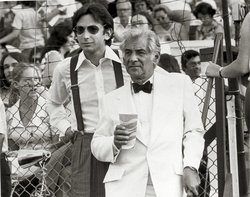
Bernstein with conductor Michael Tilson Thomas, at 1974 Charles Ives Centenary Concert in Danbury, Connecticut.
Leonard Bernstein (August 25, 1918 – October 14, 1990) was an American composer and orchestra conductor.
Biography
Bernstein was born in Lawrence, Massachusetts and studied at Harvard and the Curtis Institute of Music in Philadelphia. He was highly regarded as a conductor, composer, pianist, and educator. He is probably best known to the public as long time music director of the New York Philharmonic Orchestra; for conducting concerts by many of the world's leading orchestras; and for writing the music for the musical West Side Story. All told, he wrote three symphonies, two operas, five musicals, and numerous other pieces. Bernstein's politics were decidedly left wing, but unlike some of his contemporaries, he was not blacklisted in the 1950s. In the late 1960s and early 1970s he actively supported groups such as the Black Panthers and publicly opposed the Vietnam War.
During the 1960s, he became a well-known figure in the US through his series of 'Young People's Concerts' for US public television.
On Christmas Day, December 25, 1989, Bernstein conducted Beethoven's Symphony No. 9 as part of a celebration of the fall of the Berlin Wall. The concert was broadcast live in more than twenty countries to an estimated audience of 100 million people. For the occasion, Bernstein reworded Friedrich Schiller's text of Ode to Joy, substituting the word 'freedom' (Freiheit) for 'joy' (Freude). 'I'm sure that Beethoven would have given us his blessing', said Bernstein.
Bernstein was a highly-regarded conductor among many musicians, in particular the members of the Vienna Philharmonic Orchestra, of which he was a regular guest conductor. However, some people found his histrionic conducting style irritating and distracting; he danced and went into fits of exultation as he conducted. Bernstein's personal life was marked by anguish over the tradeoff between a conductor's glory and a composer's productivity, and the criticism invited by his impassioned political activism, It has been alleged that Bernstein was also conflicted about his devotion to his family and his bisexuality, but Arthur Laurents (Bernstein's collaborator in West Side Story), told Charles Kaiser (author of The Gay Metropolis) that Bernstein was simply 'a gay man who got married. He wasn't conflicted about it at all. He was just gay.' Another friend of Bernstein, Shelly Rhoades Perle, told Bernstein's biographer, Meryl Secrest, that she thought 'he required men sexually and women emotionally.'
Bernstein suffered bouts of depression in his later years.
Bernstein married Felicia Montealegre, a Chilean, in 1951 and with her had three children. Although a loving father, Bernstein was notorious in the musical world for his promiscuity. The couple separated in the mid-1970s when she discovered that Bernstein had had several homosexual relationships. After the separation with his wife, Bernstein lived with Tom Cochran, his lover since 1971. He returned to his wife when she became terminally ill.
Awards and recognitions
Principal works with first performance dates
Works for the theater
- Fancy Free (ballet), 1944
- On the Town (Musical), 1944
- Facsimile (ballet), 1946
- Peter Pan (songs, incidental music), 1950
- Trouble in Tahiti (opera in one act), 1952
- Wonderful Town (musical), 1953
- On the Waterfront (film score), 1954
- Candide (operetta), 1956
- West Side Story (musical), 1957
- Mass (theatre piece for singers, players and dancers), 1971
- Dybbuk (ballet), 1974
- 1600 Pennsylvania Avenue, 1976
- A Quiet Place (opera in two acts), 1983
- The Race to Urga (musical), 1987
Orchestral works for the concert hall
- Jeremiah, Symphony No. 1, 1944
- Fancy Free and Three Dance Variations from 'Fancy Free,', concert premiere 1946
- Three Dance Episodes from 'On the Town,' concert premiere 1947
- The Age of Anxiety, Symphony No. 2 (after W. H. Auden) for Piano and Orchestra, 1949
- Serenade (after Plato's 'Symposium') for Solo Violin, Strings, Harp and Percussion, 1954
- Prelude, Fugue and Riffs for Solo Clarinet and Jazz Ensemble, 1955
- Symphonic Suite from 'On the Waterfront', 1955
- Symphonic Dances from 'West Side Story', 1961
- Kaddish, Symphony No. 3 for Orchestra, Mixed Chorus, Boys' Choir, Speaker and Soprano Solo, 1963
- Chichester Psalms for Mixed Choir, Boy Soloist and Orchestra, 1965
- Dybbuk, Suites No. 1 and 2 for Orchestra, concert premieres 1975
- Songfest: A Cycle of American Poems for Six Singers and Orchestra, 1977
- Three Meditations from 'Mass' for Violoncello and Orchestra, 1977
- Divertimento for Orchestra, 1980
- Halil, nocturne for Solo Flute, Piccolo, Alto Flute, Percussion, Harp and Strings, 1981
- Concerto for Orchestra, 1989
Choral music for church or synagogue
- Hashkiveinu for Solo Tenor, Mixed Chorus and Organ, 1945
- Missa Brevis for Mixed Chorus and Countertenor Solo, with Percussion, 1988
- Chicester Psalms for Mixed Chorus, Organ, Harp and Percussion, 1965
Chamber music
- Sonata for Clarinet and Piano, 1942
- Brass Music, 1959
Vocal music
- I Hate Music: A cycle of Five Kids Songs for Soprano and Piano, 1943
- La Bonne Cuisine: Four Recipes for Voice and Piano, 1948
- Arias and Barcarolles for Mezzo-Soprano, Baritone and Piano four-hands, 1988
- A Song Album, 1988
Other music
- Various Piano pieces
- Other occasional works, written as gifts and other forms of memorial and tribute
Books
(The following books are all by Bernstein, except for the second.)
- Findings. Originally published by New York: Simon and Schuster, 1982. New edition, New York: Anchor Books, 1993 has ISBN 038542437X.
- Gottlieb, Jack, editor. Leonard Bernstein's Young People's Concerts. Printed by New York: Anchor Books in 1962, reissued by them in a revised edition in 1992 with ISBN 0385424353.
- The Infinite Variety of Music. Originally published by Simon and Schuser, 1966. New York: Anchor Books, 1993. ISBN 0385424388.
- The Joy of Music, originally c 1959. Pompton Plains, New Jersey: Amadeus Press edition, c 2004, ISBN 1574671049.
- The Unanswered Question. Cambridge, Mass: Harvard University Press, 1976. ISBN 0674920007.
See related composers
External links